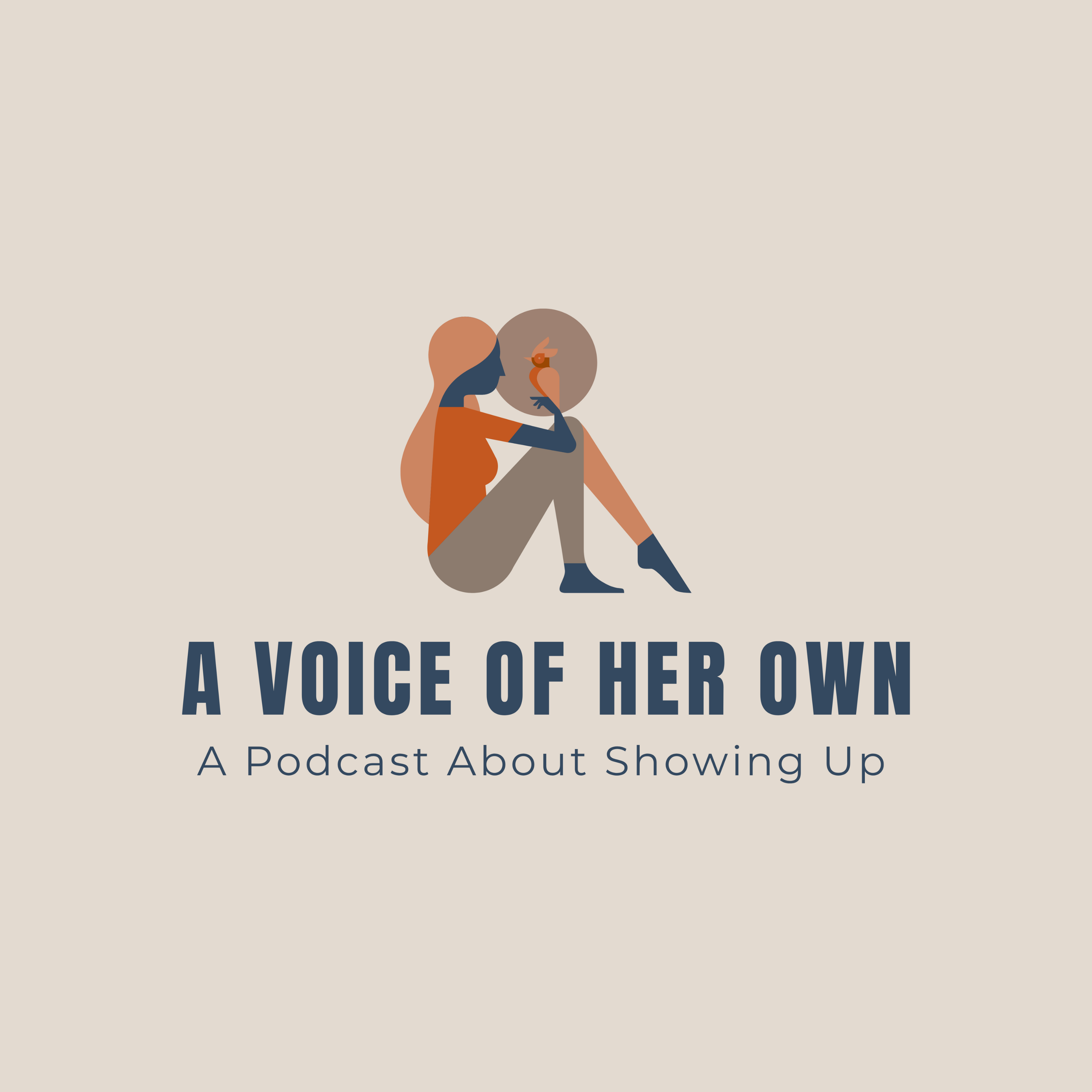Episodes
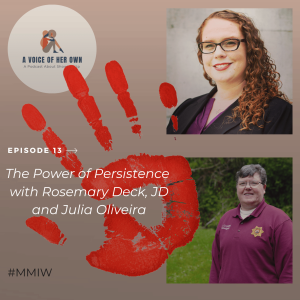
Thursday Apr 27, 2023
The Power of Persistence with Rosemary Deck, JD, and Julia Oliveira
Thursday Apr 27, 2023
Thursday Apr 27, 2023
Have you ever seen the hashtag #MMIW ? Do you know what it means? Do you know why it matters?
In this episode I interview Julia Oliveira, the first dedicated Missing and Murdered Indigenous Persons Investigator in the state of California, and Rosemary Deck, JD, Chief Prosecutor for the Yurok Tribe, the largest tribe of Indigenous Peoples in the state of California.
Northern California, where the Yurok reside and where this podcast is recorded, has a disproportionately large number of missing persons cases, and a very large percentage of these cases - again, hugely disproportionate - are Missing and Murdered Indigenous Persons (also known as Missing and Murdered Indigenous Women.)
The statistics around violence to Indigenous and Alaska Native women not just in California but across the United States and Canada are truly alarming. But this issue doesn’t stop at the border of the reservation. It ripples across communities, further perpetuating the struggles of those who have suffered systemic colonization, violence, and the effects of historical trauma, and those of us who live on land taken by force and subjugation.
Ultimately, this is a hopeful episode, because increasing awareness and knowledge is key to addressing this “open wound” as Julie calls it, suffered by so many families in California, and across the country. We can be good allies; we can be good neighbors. We can support the efforts of the Yurok Tribe to assist other tribes and law enforcement in bringing these women, and all missing Indigenous persons, home to their families and loved ones.
In this episode we discuss:
- the unique approach of the Yurok Tribe and tribal courts to restorative justice and asserting the sovereignty of the Tribe and tribal lands
- the alarming and disproportionate statistics surrounding Missing and Murdered Indigenous Persons in California, particularly women, and particularly in Northern California
- the federal government reports that there are currently 5000 missing Indigenous and Alaska Native women, but that number is underreported.
- 4 out of 5 Indigenous and Alaska Native women will experience violence, and 1 in 3 in the last year.
- homicide is the 3rd leading cause of death of Indigenous and Alaska Native women.
- Indigenous and Alaska Native women are 30 times more likely to be the victims of violence than white women.
- the pilot partnership with the US Marshal’s Office that came about due to the MMIP Summit hosted by the Yurok Tribe
- the ripple effect of these cases and the prevalence felt in the tribal communities
- the challenges and partnerships with state and local law enforcement under PL 280, which gives the state criminal jurisdiction over the tribal lands
- the confusing and contradictory jurisdictional issues under PL 280 and how that affects the law enforcement response (which is already strained due to nationwide staffing shortages)
- the historic attitudes between law enforcement and tribal communities and how positions like Julie Oliveira’s can be a bridge to better cooperation
- the importance of preserving the Yurok language and the cultural implications of using the language
- the To’ Kee Skuy’ Soo Ney-Wo-Chek’ program and how it was developed through the efforts of Chief Justice Abby Abinanti and Dr. Blythe George of the Yurok Tribe working with the Sovereign Bodies Institute
- the hope to empower other tribes to do this work through the toolkit created by the Yurok Tribe
- the case of Emmilee Risling, and the jurisdictional issues that point to the need for coordinated responses to missing persons reports
- the scope of the issue as Julie begins work as the first dedicated MMIP investigator, and the response from the communities
- working with the California Office of Indian Affairs to gather data and share information, which could be a template for other tribes moving forward
- the different systems tracking missing persons and the confusing lack of communication between them
- the challenges with the reported data and how it leads to underreporting of the issue of MMIP
- the need for research on the outcome disparities between states with PL 280 and without PL 280 because of the maze of jurisdictional issues the law has created
- the policy advocacy of the Yurok Tribe to address MMIP issues from a legislative perspective
- the creation of the Feather Alert to notify law enforcement of missing Indigenous persons
- the factors that contribute to the high numbers of MMIP in Northern California: the rural, wild areas of the state, the history of the black market economy of cannabis, the lack of mental health and social services, the historical and intergenerational trauma of colonizers and state-sanctioned cultural eradication of Indigenous peoples
- the necessity of a trauma-informed response from law enforcement to these cases
- the problem of a lack of services for people with a dual-diagnosis of mental health issues and substance abuse issues
- the frustration of law enforcement dealing with mental health and substance issues without resources to address them
- the actionable practice: native and tribal organizations to support; coming forward with information if you’re able to help resolve the wounds of the families missing loved ones, going out and learning about the issues and meeting your tribal neighbors
- the MMIP tip-line: (833)975-6647
- being a better neighbor and honoring the bonds of community
Links discussed in this episode:
To’ Kee Skuy’ Soo Ney-Wo-Chek’ (MMIP) – Yurok Tribal Court
Restoring Justice for Indigenous Peoples
Strong Hearted Native Women's Coalition, Inc.
California Tribal Families Coalition
Stolen - The Search for Jermain
Shoutouts:
Use this code at checkout to receive 25% off your first order: EQUINOX25
Scribd
Use this link to get 60 days free:
https://www.scribd.com/g/8w1vki
Hungryroot
Use this code to get $50 off your first grocery delivery:
https://www.hungryroot.com/r/A2KV2H
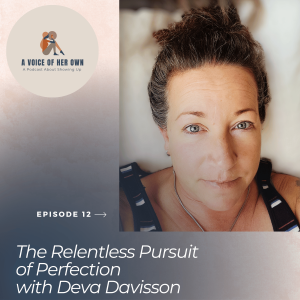
Thursday Apr 13, 2023
The Relentless Pursuit of Perfection with Deva Davisson
Thursday Apr 13, 2023
Thursday Apr 13, 2023
Why do we worship perfection? What gives when we pursue it? Why do we compare ourselves and talk harshly to ourselves, and why do we always find ourselves lacking? What does perfectionism steal from us, and what can we do instead?
If you’ve ever found yourself stuck in a perfectionism paralysis, or never given yourself the kudos you deserve, this episode is for you. You are enough.
In this episode I discuss:
- The relationship between perfectionism, procrastination, and paralysis.
- The nervous system response that perfectionism engenders.
- The rise in perfectionist tendencies over the last few decades.
- How social media teaches us to constantly compare ourselves and find ourselves lacking.
- The rise of perfectionism in a scarcity culture of financial uncertainty.
- How helicopter parenting can contribute to perfectionist tendencies.
- The roots of perfectionism in a Puritan society, and how we seek to perfect ourselves to escape sin and death.
- The Apollonian and Dionysian perceptions of reality, and how our Western obsession with Apollonian values is a perfectionist creed.
- How perfectionism is a move away from the feminine and the earth.
- How perfectionism is an attempt to control the human experience, and the negative adaptive behaviors that result from it.
- Reframing envy and comparison to understand that we are enough, just as we are.
- Examining our self-talk and catching the critical inner voices before we’re damaged by them.
- The inability to give ourselves credit and reward, and how we rob ourselves of our most motivating brain chemistry response.
- The debilitating consequences of being motivated by fear instead of reward.
- The Takeaway: A three-minute nightly practice to boost dopamine and motivation.
Links discussed in this episode:
Huberman Lab: How to Increase Motivation and Drive
Shout-outs:
Use this code at checkout to receive 25% off your first order: EQUINOX25
Use this link to get 60 days free:
https://www.scribd.com/g/8w1vki
Use this code to get $50 off your first grocery delivery:
https://www.hungryroot.com/r/A2KV2H
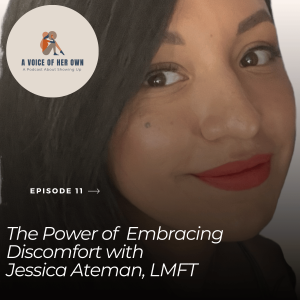
Thursday Apr 06, 2023
The Power of Embracing Discomfort with Jessica Ateman, LMFT
Thursday Apr 06, 2023
Thursday Apr 06, 2023
Jessica Ateman in her own words: Lady. Wife. Mother. Daughter. Sister. Licensed Marriage and Family Therapist. Art Therapist. LatinX. Marathon Runner. But who am I really? Those are labels that others have used to describe me or to describe accomplishments at various points in my life. I am a human, seeking to grow and help others grow. I am a nomad at heart. I love experiencing - good and bad - very much the existentialist. I believe the only person you are racing to the finish line is the person you were yesterday and I live by that.
On a more professional note: I am currently working in IBH part time in California and I am also running a private practice part time. I have spent the majority of my career in pediatric behavioral health, but have spent the last two years focused on family and couples treatment from the Gottman Perspective sprinkled with the Fair Play method. Having worked in community mental health throughout my career, I believe cultural competence and trauma informed care are essential. I also believe that the therapy world is evolving and am very much looking forward to its continued evolution.
Jess is an unapologetic powerhouse, a forward-facing, direct-speaking, no bullshite, first generation LatinX woman who also happens to be a great marriage and family therapist.
In this episode we discuss:
- creativity as self-care
- how comfort can actually cause anxiety and depression
- how discomfort can be an evolution factor to foster our own growth
- The Comfort Crisis and the Misogi Challenge
- the discomfort of not doing things well and not being a natural
- Jessica’s professional shift to seeing mental health as a holistic treatment that includes biological factors
- ice baths to reduce anxiety and depression
- the search to find the right place to live, and to settle down
- the importance of place and natural setting, and the grounding of returning to nature
- the repercussions of technology on youth; Jess recommends the book iGen
- the feedback loop of information from social media and the effects on development
- feeling like an impostor in your own culture due to the mixed messages of social media
- Anthony Bourdain on the displacement of Chicanos in American society
- the pressures of being a first generation citizen from a family of immigrants
- the dynamics of living in a mixed-race family in our current political atmosphere
- raising children with radical honesty regarding race and culture
- the importance of having the hard conversations, particularly regarding race
- how saying “I don’t see color” is actually saying you don’t believe the different lived reality of people of color and not acknowledging the truth of their lived experience
- how Americans lack a sense of place and how the “I don’t see color” attitude connotes a lack of understanding of an individual’s place of roots, family, and origin
- the “rape-colored skin” article and how people become ‘white-presenting’
- how representation in popular culture is a key piece of opening discussions around race and culture, particularly with children
- how being a part of the generation breaking the legacy of intergenerational trauma requires constant learning and evolving attitudes and understanding
- the habits of thought, attitudes, and assumptions about reality that are passed down through generations without conscious knowledge
- the year of fearlessness and living without shame
- the therapist as healer and the modern version of the bruja
- The Gift of Fear - how women are taught not to trust their own intuition
- the internal compass of safety and how to treat it as a reliable source of information
- the consequences of denying experiences and emotions and how we do this to our kids
- giving the grace of unconditional positive regard to the people we love
- the way that we unconsciously give our children conditional love without even realizing it
- the ripple effect of learning how to feel a change in development in ourselves and how to resource that feel
- the monkey mind and circling back to the enlightenment of discomfort
- giving yourself the gift of being seen by stating your needs and following through
- the importance of comparing yourself not to others but to who you were yesterday
- The Power of Now - mindfulness and presence as a route to knowing your own needs
- the internalized cultural constructs of what it means to be a woman and the importance of challenging those ideas through practice
- The Gottman Institute framework of couple’s therapy and the freedom of moving from conflict resolution to conflict management
- the Fair Play method of division of labor and why it’s so freaking useful to get support from your partner
- the minimum standard of care - what it means and how to negotiate it
- the resilience factor of humor and why it’s so important to relationship longevity
- the mental load of everyday life and the metaphor of holding boxes and the 13th rabbit aka trigger stacking (Warwick Schiller ) (Equusoma ) (Dr.Dan Siegel )
- the power of ritualization and how to metabolize difficult emotions
- how to harness the lowest-hanging fruits of wellness: diet, sleep, magnesium, mindfulness (Huberman Lab )
- the beauty of the 1% increase (Atomic Habits ) and one small step at a time
- the power of small, consistent, actionable steps
- Attached , Come As You Are , 7 Principles for Making a Marriage Work , Fair Play
- Dr. David Schnarch and differentiation (again)
- meeting as a couple versus meeting as individuals
- meeting clients and ourselves where we are and moving forward one step at a time
Shout-outs:
Use this code at checkout to receive 25% off your first order: EQUINOX25
Scribd
Use this link to get 60 days free:
https://www.scribd.com/g/8w1vki
Hungryroot
Use this code to get $50 off your first grocery delivery:
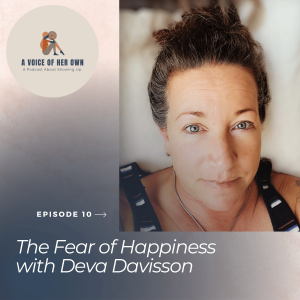
Thursday Mar 30, 2023
The Fear of Happiness with Deva Davisson
Thursday Mar 30, 2023
Thursday Mar 30, 2023
Have you ever had something really great happen, and then instead of blissing out, you found yourself waiting for the other shoe to drop?
Have you ever damped down your own feelings of joy for fear that there would be negative consequences?
It turns out, the fear of happiness is a real thing, and it has a name: Cherophobia, the aversion to happiness.
It has four strong predictors: an unhappy childhood, perfectionism, belief in black magic or karma, and loneliness.
Did you even realize you had a fear of happiness? I did not, and the more I unpacked it, the more I came to understand that this is not an irrational belief; instead, it’s a self-protective mechanism that we can slowly entrain to a different, more useful view, of how to experience joy and well-being.
In this episode, I discuss:
- why cherophobia is considered an anxiety disorder even though it is not in the DSM-5
- how cherophobia has been studied
- the predictors researchers have found across the world and across cultures
- the different forms of cherophobia
- childhood factors that can lead to an aversion to happiness
- attachment styles that are more likely to develop a fear of happiness
- the myriad ways that perfectionism keeps us from feeling joy and pride
- the sentence stem, “what right do I have to…” and how it keeps us from fulfillment and wellbeing
- the differing views on happiness in collective and individualistic societies
- the mixed messages women get around pursuing individual happiness and belief in collective wellbeing
- creating our own definition of happiness
- the loss of control of too much emotion or too much happiness
- the lack of rationality brought about by the giddy happiness of falling in love
- the co-morbidity with major depressive disorder
- the need to treat cherophobia prior to or in tandem with treating co-morbid depression
- the validity of our own responses
- how the fear of happiness is a self-protective mechanism
- the relentless positivity culture and how that disavows our own complexity and our own experience
- the psychological concept that anxiety contracts or expands depending on exposure
- the usefulness of mindfulness, self-care, and gratitude to nearly every issue of the podcast
- starting a small regimen of exposure therapy to happiness
- the self-work of learning our own negative bias and stories
- how combining mindfulness and gratitude can teach you to recognize small but powerful moments of happiness
- teaching yourself through practice and repetition that you can be happy without fear
Links discussed in this episode:
What Is Cherophobia? How to Overcome a Fear of Happiness
Fear of Happiness Underlies Some Mental Illnesses - Scientific American
What Predicts Fear of Happiness? | SPSP
Shout-outs:
Use this code at checkout to receive 25% off your first order: EQUINOX25
Use this link to get 60 days free:
https://www.scribd.com/g/8w1vki
Use this code to get $50 off your first grocery delivery:
https://www.hungryroot.com/r/A2KV2H
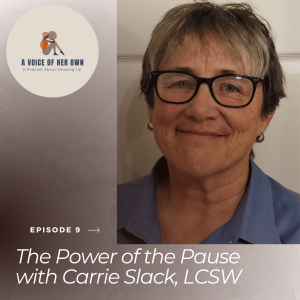
Thursday Mar 16, 2023
The Power of the Pause with Carrie Slack
Thursday Mar 16, 2023
Thursday Mar 16, 2023
Trust me when I tell you that this is the most important episode I’ve ever recorded.
My goal is to empower women to agency, authority, and action, but agency comes first. Without agency, the rest is pretty much impossible. And you cannot have agency when you’re afraid.
Carrie Slack was the first person on my list of guests I wanted on the podcast. Carrie teaches Empowerment Self-Defense, a mix of martial arts, feminist theory, and practical techniques that in peer-reviewed studies has shown a 68% decrease in sexual assault in women who have completed the course.
That’s dramatic, and it’s the message that I want you to understand: You have the means to protect and defend yourself. You just have to learn how. But it is possible and it’s available to learn, today.
1 out of every 6 women has been the victim of an attempted or completed rape.
1 in 4 women will experience physical assault in an intimate relationship.
I’m not about blaming the victim, and I don’t believe the responsibility of eradicating sexual and physical assault and Intimate Partner Violence rests on women; I believe it rests squarely on the perpetrators.
With that being said, if there was a way to learn skills that would enable you to walk through the world without fear, on your terms, would you want to know about it?
At one point in this conversation, Carrie and I talk about all the wonderful experiences that women miss out on because of the fear of assault. This makes me incredibly sad. I want women everywhere to move through the world with agency and freedom. I hope this episode contributes to this for you, today.
Trigger warnings: assault, sexual assault, domestic violence, intimate partner violence, missing and murdered indigenous women
In this episode we discuss:
- learning from zero at all stages of life
- joy, how meaningful it is, and how it increases resilience
- empowerment self-defense: what it is and how it differs from conventional self-defense
- the power of learning physical techniques and the fierceness it engenders
- the power of being victorious over your own fear and how you can take that out into life
- how understanding the framework of gender roles and expectations empowers women to be in the world in a new way
- the awareness needed to move through the world with agency
- the way our internal messaging of being “nice” no matter what puts us in positions of danger
- our fear of making someone else “feel bad” and how it co-opts our own intuition
- the skill of giving yourself permission to leave and how to practice it
- Stacey Ramsower’s actionable practice of taking a pause from ep 1
- how to create a space to determine what is actually happening and what we actually want
- asking ourselves what we owe any one person in terms of time and energy, and how that applies to all areas of our life
- what it takes to tolerate the discomfort of making other people unhappy, and why this is so essential to our own wellbeing and safety
- how fawning is a deeply-held survival mechanism and not a reason to be feel shame
- the evolutionary reasons we developed fawning and why it makes sense to approach risk with this behavior
- how learning to say no and tolerate discomfort requires practice and tools
- developing a personal bill of rights of how we deserve to be treated and what our rights are in any particular situation
- the studies that show a huge reduction in attempted - not just completed - assault after completing an empowerment self-defense course and how that relates to the clarity of knowing your own rights
- how perpetrators of sexual assault push to see what resistance they will encounter and how setting a boundary early is often very effective
- why the reaction to setting a boundary is an indication of character and intent
- how boundaries are loving and help us to be good to one another
- the principles of empowered self defense: think, yell, leave, fight, and tell
- the power of awareness, noticing, and intuition
- how part of “think” is getting accurate information about the threat of violence to women
- the danger of misinformation, such as the belief that fighting back or yelling increases the risk of harm when the opposite is actually true
- the evidence that resistance drastically increases our chances of escaping sexual assault
- the importance of the conversation around what women can learn, do, and practice to increase their agency in the world
- the misinformation about where assaults actually happen and what we miss out as a result
- the fear-based messaging of the last decades and how that has impacted women’s agency and enjoyment of life experiences
- the importance of believing your intuition and embodied experience
- using your voice to speak up for yourself and others and to express your boundaries clearly
- the five-word technique to keep your boundaries clear and known
- the practice of learning how to leave the room
- the reality of Intimate Partner Violence and the violence against women, particularly those in marginalized populations
- the compassion and support needed for women dealing with abusive partners
- the financial piece of abuse and how it traps women
- how women can successfully use physical resistance to keep themselves safe regardless of strength, speed, or fitness
- the willingness to fight for yourself and the will to live
- how the mindset of being whole, healthy, and safe is absolutely key to overcoming a threat
- the challenge of fighting off someone known versus a stranger
- the difficulty of overcoming the societal obligation of niceness when it involves a friend or acquaintance
- the pros and cons of carrying a weapon or self-defense aid
- how the confidence in your own body cannot be taken from you or used against you
- seeking out support and the power of telling your own experience
- the importance of having control over your own narrative and how it’s shared
- the power of the pause and the practice of leaving the room
- the mental trick of reversing the situation in your mind to gain clarity and take action
- giving yourself the gift of agency
Links mentioned in this episode:
To get more information about hosting or attending a class on Empowerment Self-Defense, contact Carrie Slack at Carrie-Slack@redwoods.edu
National Women’s Martial Arts Federation
Debbie Leung Self-Defence: The Womanly Art of Self-Care, Intuition, and Choice
Women's self-defense and sexual assault resistance: The state of the field
A Voice of Her Own Ep. 1: Stacey Ramsower and the Power of Pleasure
Shout-outs:
Smalls Use the code FRIENDSOF2 to get a free box
Neurogan Use this code at checkout to receive 25% off your first order: EQUINOX25
Scribd Use this link to get 60 days free: https://www.scribd.com/g/8w1vki
Hungryroot Use this code to get $50 off your first grocery delivery: https://www.hungryroot.com/r/A2KV2H
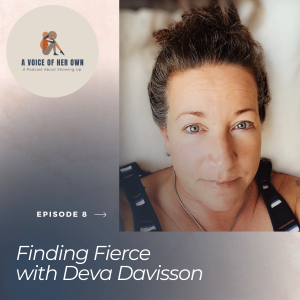
Friday Mar 10, 2023
Finding Fierce with Deva Davisson
Friday Mar 10, 2023
Friday Mar 10, 2023
Why is women’s anger so taboo? What causes our deep discomfort with expressions of anger, and why do we continually repress it regardless of the physical and mental health consequences? Is there a way that anger could be our friend? How do we recognize it, and how do we keep from turning into an “ugly, crazy, rage monster” if we dare to let it out? And what would happen if we decided to find our own fierceness and use it on our own behalf?
In this episode, I discuss:
- The difference between anger, rage, hate, passion, and fierceness.
- How women’s passionate expressions can be interpreted as anger.
- How our culturally acceptable female response is passive acceptance.
- How the “cool girl” trope sells us out.
- The societal stereotype that angry = crazy.
- Our internalized belief that anger makes us unattractive and how that sources our power externally.
- How anger belongs to men and all other expressions of emotion belong to women.
- Workplace consequences of women expressing anger, and the double bind of appearing cold and inauthentic when women keep their emotions controlled.
- How studies show that a majority of white men both do not feel penalized for expressing anger and also feel comfortable expressing anger in the workplace.
- How women are expected to show sadness, not anger, and how that keeps them from being motivated towards change.
- Our expectations of soft language, accessibility, support, and availability from women in the workplace.
- The root of many of the issues discussed on this podcast is women’s inability to tolerate the discomfort or dislike of others.
- How common Intimate Partner Violence is and how the issues of anger, fawning, and violence against women are intertwined.
- What happens when women learn the skills to not be afraid of physical or sexual assault, and why this is a necessary part of true agency.
- The cultural and racial components of our perception of the expression of anger in women (and children) and how this keeps us in tired, oppressive, stereotypes.
- Our cultural interpretations of what anger means and is trying to convey, and how passionate discourse can be used as a bid for connection.
- Where is anger useful, and how can we come to terms with our own anger?
- The health consequences of repressing anger, particularly in “women’s illnesses.”
- How reframing anger as fierceness allows us the freedom to express our anger on our own behalf.
- The common female cycle of repression, rage, and shame, and how it damages us and needs to stop.
- How sourcing our own power requires us to learn independence and competence in areas we may not enjoy or know well.
- The actionable steps that arise from admitting and recognizing our anger, and understanding the emotion that preceded it.
- The takeaway: A titrated practice of speaking up for yourself.
Links discussed in this episode:
Intimate Partner Violence Statistics and National DV Hotline: 1-800-799-SAFE (7233)
APA: Anger Across the Gender Divide
And what makes ordinary women angry day-to-day? In 1993, Thomas conducted the Women's Anger Study, a large-scale investigation involving 535 women between the ages of 25 and 66. The study revealed three common roots to women's anger: powerlessness, injustice and the irresponsibility of other people.
Women are angrier than men – they just hide it better.
Some have suggested that these gender differences are rooted in underlying differences in brain biology. One study, by Ruben and Raquel Gur, a husband and wife team at the University of Pennsylvania School of Medicine, found that while the amygdala is a similar size in men and women, a second region, called the orbital frontal cortex, which is involved in controlling aggressive impulses, is much larger in women. They suggested this could help explain why women seem to be better at keeping the lid on explosive outbursts.
Workplace Anger Costs Women Irrespective of Race
Findings revealed that men and women were both viewed as more competent when expressing anger relative to sadness, and this pattern did not differ across employee race. However, despite anger being associated with greater competence, women who violated stereotypes (i.e., expressed anger) were accorded lower status than stereotype-inconsistent (sad) men. Furthermore, exploratory analyses revealed that this pattern was consistent regardless of target and participant race.
How women and minorities are claiming their right to rage
In schools, for example, girls are expected to exert greater self-control, to be more polite, and not to use strong or obscene language. All of these also limit the expression and display of anger. Educators and psychologists studying these dynamics note that in girls, assertiveness, aggression and anger are often conflated so that girls who defend themselves, hold strong opinions and are competitive and verbally self-assured are frequently pegged by adults as rude, belligerent, confrontational and uncooperative. However, in boys, the same behaviours are often seen as signs of leadership, confidence and creative disruption.
Social and biased regulation of emotional expression also results in black and minority ethnic children being held to different and higher standards of behaviour. Black students are seen by adults as less innocent and in need of patience or care. Starting in pre-school, black boys are three times as likely to be disciplined as white boys. Black girls, however, held to both racial and gender expectations, are six times more likely than white girls to be suspended or expelled.
Shout-outs:
Use this code at checkout to receive 25% off your first order: EQUINOX25
Use this link to get 60 days free:
https://www.scribd.com/g/8w1vki
Use this code to get $50 off your first grocery delivery:
https://www.hungryroot.com/r/A2KV2H
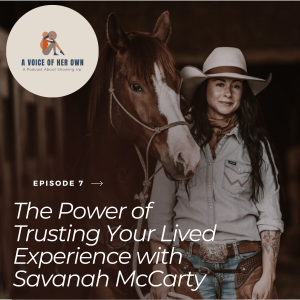
Thursday Mar 02, 2023
The Power of Trusting Your Lived Experience with Savanah McCarty
Thursday Mar 02, 2023
Thursday Mar 02, 2023
Savanah McCarty is a cowgirl, social worker, non-profit founder, ranch boss, and advocate for the responsible use of plant medicine to heal trauma and treat mental health issues.
The owner of S+S Stables Equine Center for Mental Health in Bozeman, MT, Savanah’s journey - from creating her dream job as founder and executive director of a successful non-profit equine therapy program in Northern California to dealing with debilitating depression and anxiety so intense she resigned and followed the call to move to the rugged heart of Montana, to healing from a devastating miscarriage and subsequent accident that left her near death - is a journey of learning to trust herself and her own lived experience to guide her to her life’s mission.
“You can’t work in your pain anymore. You can’t look at your childhood trauma every single day anymore. You’re past that. Move on.”
This is a conversation with a woman who embodies agency, authority, and action. Savanah is bold, brave, direct, and unapologetic about who she is and what she believes. She’s also very thoughtful about what it means to listen to your own voice - and act on it.
In this episode, we talk about:
- Savanah’s return to feeling love and grief after a traumatic brain injury (TBI) and near-death experience
- growing out of her life-long dream position as founder of a California non-profit and the inner journey that led to starting a business and finding community in Montana
- Savanah’s past as a foster youth and the healing power of horses that inspired her journey with equine therapeutic services
- her experience with debilitating depression and anxiety as the public face of a non-profit and her journey towards alternative healing modalities
- the brave choice to move to Montana and the physical reality of learning how to survive
- getting in touch with the rhythms of the seasons and the gift of being forced inward in the winter, and the writing that came out of being alone
- the beginnings of Savanah’s plant medicine journey and how it led her to choosing herself for the first time in her life
- how we recreate the situations that need to be healed
- the power of acting with integrity - choosing to be in a place where self-experience is not something to be hidden
- S+S Stables’ all-female crew of ranch hands and how that came to be
- the irreplaceable knowledge of lived experience
- the resilience that comes what learning what you’re made of in challenging circumstances and in taking on great responsibility
- the movement towards alternative and experiential healing modalities and the value of therapeutic horse experiences
- the power of community and feeling accepted for being her true self for the first time in her life
- the revelation of pregnancy in healing the mother wound and the anguish of miscarriage
- the accident that led to a near-death experience and coma, and the community who rose to the need and wrapped her in care while taking care of her business and 30 head of horses
- Savanah’s choice to quit opiate pain meds and begin plant medicine treatment, and the importance of guidance and support on the plant medicine path
- how anxiety expands or contracts depending on exposure
- the fear of getting back on the horse and the strategies Savanah used to come back to her touchstone
- when to fish or cut bait on your life’s mission
Find Savanah on Instagram @thevelvetspur and @ssstables_bozeman
and on her website S+S Stables
Links mentioned in this episode:
We didn’t talk about this on the recording, but Savanah recommended Dr. Dan Engle and his book A Dose of Hope: A Story of MDMA-Assisted Psychotherapy which you can find on AbeBooks and on Scribd. Very excited to read it!
Shout-outs:
Neurogan Use this code at checkout to receive 25% off your first order: EQUINOX25
Scribd Use this link to get 60 days free: https://www.scribd.com/g/8w1vki
Hungryroot Use this code to get $50 off your first grocery delivery: https://www.hungryroot.com/r/A2KV2H
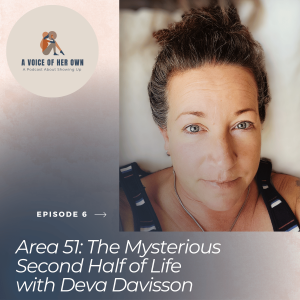
Thursday Feb 23, 2023
Area 51: An Episode About the Mysterious Second Half of Life
Thursday Feb 23, 2023
Thursday Feb 23, 2023
It’s a bird! It’s a plane! Oh, wait… it’s just my birthday.
Aging is so mysterious, isn’t it?
In this special birthday episode I discuss:
- Why aging has more in common with Area 51 than you’d think (okay, this might be a stretch but it’s my birthday, so just go with it)
- The way our psyche attaches to a certain conception of self at a particular age
- The wisdom of each decade
- The peace and acceptance of aging
- The Area 51 metaphor: Aging is mysterious, dangerous, weaponized, full of unidentified objects, secretive, and erased
- The differing generational experiences of aging
- The surprising life-changing discoveries of mid-life
- Speaking of surprising - the sexual satisfaction of people in the second half of life
- The use of sexuality as a power and as a manipulation
- The challenge of figuring out an ‘appropriate’ way to be in the world as an aging woman
- The effect of media and images on our self-perception and mental health
- The limiting roles of women past childbearing age and some alternate possibilities
- The liberation of stepping outside the mating game
- The line between self-acceptance and complacency
- The deep complexities of what it means to foster self-validation versus external validation
- Approaching the complexity of aging and self-image with curiosity
- Recognizing the limits and blessings of mortality
- What is meant for you is coming to you and what is not, you can let go
- The takeaway: Mirror work to practice self-love
Links mentioned in this episode:
Brene Brown on the Tim Ferriss Show
David Schnarch - Passionate Marriage
Sharon Blackie - Hagitude (not referenced in episode but a wonderful resource)
Shoutout:
Equinox Equestrian Coaching www.equinoxeq.com
Use code AREA51 to get 51% off your first online session
Neurogan
Use this code at checkout to receive 25% off your first order: EQUINOX25
Scribd
Use this link to get 60 days free:
https://www.scribd.com/g/8w1vki
Hungryroot
Use this code to get $50 off your first grocery delivery:

